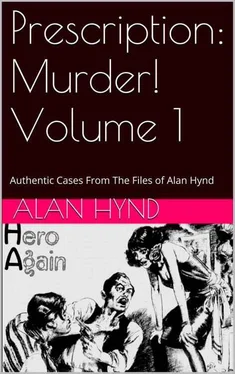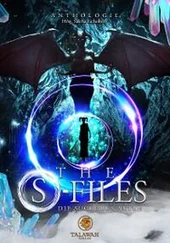“What’s wrong, Doc?” asked Boomhower.
“It’s Pete Sparling.”
“Pete?” asked Boomhower, who knew the lad. “Why, he looks the picture of health. What’s the matter with him?”
“Acute pancreatitis.”
“Sounds serious. Exactly what is it?” The doctor reduced the ailment to layman’s language and indeed it was serious. At age twenty-five and at six feet two-hundred pounds, Peter should have been the very picture of Dairy State health. Instead, these days he was walking around the farm clutching his stomach. And, sure enough, Pete died shortly afterward, little more than a year after his father had died.
It wasn’t long after Pete’s death that Doctor MacGregor suggested to Mrs. Sparling that she and the boys leave the farm and move someplace else to get away from their sorrow. Everybody, especially Mrs. Sparling, was all for it. So Mrs. Sparling sold the farm and bought a smaller farm out of Sanilac County and up in Huron County, just outside of Ubly, where Doc MacGregor’s office was located. By this time, MacGregor was also acting as the merry widow’s financial advisor, so the move was quickly a done deal. The only dissenting voice was Old John Sparling who was now in the habit of popping off to anyone who would listen about the relationship between the esteemed country doctor and his late son’s wife. Gossip did begin to spread, but it didn’t have much traction.
A few months after the Sparlings moved into Huron County, fate intervened again. Who should become Prosecutor of the Huron County but Xenophon Boomhower? The Sparlings had just gotten themselves settled on their new farm and Xenophon had just gotten his seat warm as Prosecutor when Doctor MacGregor walked into his office one day with a worried look.
“What’s wrong, Doc?” asked the Prosecutor. Dr. MacGregor ran a nervous hand over his forehead.
“I’m worried, Xenophon,” he said. “Worried about Albert Spalding.”
“Good God, Doc!” said Boomhower. “Don’t tell me there’s something wrong with somebody else in that family!”
Well, sadly, yes. There was. Albert, Doc explained to the Prosecutor, had lifted a piece of farm machinery that had been too heavy for him and seriously injured himself internally. MacGregor paced up and down the Prosecutor’s office.
“I’m just scared,” he said. “Scared that we’re going to lose another Sparling. And I’d hate for any suspicion of foul play to fall on Carrie.”
“Heaven forbid, Doc!”
There was, MacGregor pointed out, a bright spot on the horizon. Thanks to his friendship and foresight, Mrs. Sparling was being well taken care of by insurance. The lady had, at his suggestion, taken out a couple of additional policies — one on Albert, the boy who had injured himself, and one on Scyrel, with a company called The Gleaners, which was also represented by the doctor’s father.
Boomhower got out a pencil and paper and began to do some figuring. Mrs. Sparling was now carrying in excess of $5,000 insurance, a lot of money then. When he was through, he looked up at MacGregor and said,
“Doc, it sure is a good thing that family met you. Why, with Old John and Pete dying and with Albert in danger, poor Mrs. Sparling would be in an awful fix if it weren’t for that insurance. You’ve been one real friend to that family, Doc, I must say.”
A week or so after his visit to Boomhower’s office, Doctor MacGregor stopped by the only automobile dealer in Bad Axe and said he wanted to buy an automobile. Doc selected his automobile and said he would want delivery in about a month.
“How do you want to pay for it?” asked the dealer.
“In cash,” said MacGregor. “I’ll have the money in about a month.”
A couple of Sundays later, Albert Sparling complained of increased pains in his stomach. At dinner, Albert had no enthusiasm for eating. Doctor MacGregor took him into his office, which was in the front of the house, and gave him some medicine.
“There’s nothing to worry about,” MacGregor told Albert. “You’ll be behind the plow in a few days.”
However, sadly enough, Albert wasn’t behind a plow at all in a few days. He was six feet under in the family plot, not far from his father and older brother. Doctor MacGregor ascribed the death to the stomach injury that he had mentioned to Prosecutor Boomhower.
Then, less than a fortnight after the burial of the third Sparling, Doctor MacGregor took possession of his horseless carriage, paying cash for it. It was now April, 1911. Uncle John went wild with his accusations. How, he wanted to know, could MacGregor have afforded a new motorcar? The doctor often received a bartered payment for a house call — chickens, eggs or butter — and when he did receive cash the payment was two dollars. Nor had he been a wealthy man, it was recalled, when he had first examined, so to speak, Carrie Sparling.
Nonetheless, after Peter’s unfortunate passing, the doctor and his wife — remember his wife? — set out on a drive to his native Ontario. While the MacGregors were away on the trip, Mrs. Sparling bought a fine white house, for investment purposes, right in the village of Ubly, not, in fact, more than a hoot and a holler from the Doctor’s residence. When the MacGregors returned from their trip, there was some interesting action in Ubly. The house that Mrs. Sparling purchased was a big rambling affair. Since MacGregor was only renting the house where he lived and had his office, Mrs. Sparling, the widow, suggested that Dr. and Mrs. MacGregor rent the house she had bought.
And so they did. It wasn’t long after the Doctor and his wife had taken up residence in the Widow Sparling’s property that Mrs. MacGregor didn’t feel well. The Doctor made a hasty diagnosis of the trouble.
“Dear,” he said, “I’m afraid this climate is bad for your health. I suggest that you take a trip to Ontario and visit your relatives. That ought to clear things up.” As soon as Mrs. MacGregor left town, there was plenty of action in the house MacGregor was renting from the Widow Sparling. The widow frequently drove into Ubly from her farm, early in the morning, to spend the whole day in the house. One night, when the MacGregors were visiting the Boomhowers, the doctor seemed to be depressed again.
“What’s the matter, Doc?” asked Boomhower.
Plenty was the matter. Scyrel, the youngest of the Sparlings, had taken to his bed.
“Good God!” said Boomhower. “Don’t tell me somebody else in that Sparling family is going to die!”
MacGregor said he feared the youngest of the Sparlings had cancer. He had decided to call in other physicians for a consultation. MacGregor called in not one, but three doctors to look at Scyrel.
One was a local physician named Dr. Daniel Conboy. Dr. Conboy had extensive training in toxicology. While he had been consulted in Albert’s death and had previously agreed to the diagnosis of acute pancreatitis for Albert, something hadn’t smelled quite right to him about Albert’s passing. So he came into the Scyrel situation with some lurking suspicions. And since the passing of Albert, Dr. Conboy had consulted his trusty Encyclopedia of Medicine and found Scyrel’s symptoms indicated something else entirely: arsenical poisoning.
As Scyrel’s situation deteriorated, Dr. MacGregor, perhaps anticipating the thoughts of Dr. Conboy, out of the blue asked Dr. Conboy if he suspected arsenic as the cause for the patient’s itchy extremities and the irritation in his nose, mouth and throat. Conboy, surprised, allowed that this very well might be the case.
Boomhower specifically told Dr. MacGregor to notify him upon Scyrel’s death, for he wanted to order an autopsy. Dr. MacGregor again added that folks shouldn’t be surprised if the autopsy did show signs of arsenic. The Sparling boys were chronic consumers patent tonics, which contained the very same. Manufacturers did not have to adhere to any government regulations, and these “medicines” and “elixirs” promised cures for everything from scarlet fever to gout, and prevention of almost everything else.
Читать дальше












